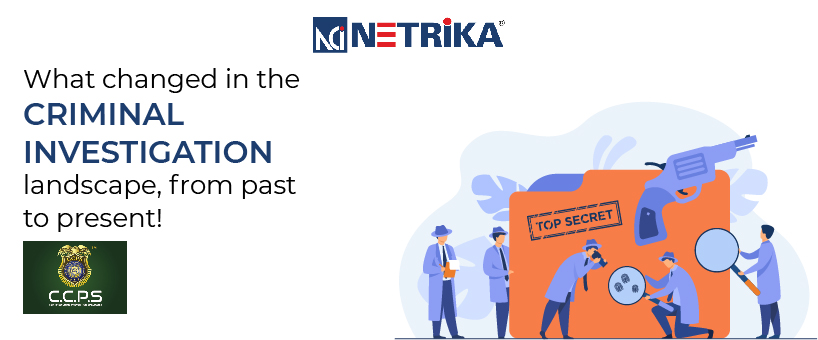The evolving landscape of criminal investigation strategies
- March 10, 2023
- Posted by: marketing@netrika.com
- Category: Blogs

The drift in criminal investigation patterns: What changed and why?
It is often a concept in crime prevention certifications to delve into the changing crime prevention patterns and strategies. While the nature of this training concept is much associated with the thriving characteristics of criminal incidences, but also has its contributing factors of changing technology. To say that technological aspects such as computers, communication systems, hacking strategies, criminal behavior, etc are changing the crime policing profiling would be an understatement.
As crime has progressed from the traditional methods of physical dangers is now forging towards a more digital threat while incorporating the conventional bits. With changing and transforming technologies, the nature of crime is evolving and criminal investigations as well. Crime prevention certification enables a certified crime prevention specialist to keep up with this new environment while expanding their investigation space.
But how has this criminal investigation space changed?
While the developments of crime and its patterns are fundamental to its nature, the evolution is complex for the identification and deterrence of crime. The transformation of crime science is so rapid that law enforcement and certified crime prevention specialists will struggle to cope with or without a laid-out strategy and comparisons or dissimilarities to the past crime patterns.
In criminal investigations, there is often an array of competing possibilities that guide the theory of criminal incident development, how it occurred and what are circumstantial information points to crime assailants. However, these competing theories require thorough examination and evaluation of physical evidence and facts. The evidence can be a credible witness, physical exhibits, a confession, etc. However, the most vital aspect throughout the investigation is how it was carried out, whether it followed the government obligations, was the evidence was cross-checked, preserved, documented, and the quality of the investigation.
With the inclusion of technology, these aspects have changed completely. In the past, where crime prevention specialists or law enforcement would have access to limited resources for collecting evidence, recording it, preserving it, and ensuring its authenticity before it is presented. Now technology has given access to unlimited tools to explore and exploit to maintain the authenticity of the evidence and even churn out data from places where it was never imagined before.
However, with this shift, there has been a major drift in the nature of the crime, making the investigation process evolving, complex, twisted, and sometimes difficult to comprehend.
Some of the evolving criminal spectrum changing the criminal characteristics are:
● There has been an epidemic of drug abuse fatalities, fuelled in part by the internet or dark web, where drugs can be bought and sold with minimum traceability.
● New types of crime, based on technology, are being invented that ripple the entire system in seconds. For instance, cyber-security threats such as viruses, ransomware, phishing and deep flakes masquerading as genuine individuals, businesses, or even famous personalities attack systems and networks. For example, ransomware cyber-threat blocks the victims’ access to their systems until they pay a ransom, this extorting them of their life savings, confidential information, or data as they please.
● Increasing incidents of local gangs and petty criminals exploiting technology as a means to avoid getting caught have surfaced, raising alarms of difficulty in controlling technology-driven crimes
● The technology spectrum gives birth to new and innovative forms of criminal cases, evolved behavior, and changed patterns. For example, e-banking fraud, identity theft, botnets, and cryptocurrency frauds have all weakened not just the criminal investigation system but also put to threat every vertical of business and unique ecosystem.
While technologically inclined criminal intent is on the rise, the police are not getting the level of technology-driven help. Technology is changing the criminal environment every day, and most police agencies are far behind the curve.
In the past crime prevention specialists would look at their primary roles as peacekeepers and first responders, limiting their duties. However, now with technological disruption, certified crime prevention specialists do not perform their past duties but also dig into the analytical, problem-solving part of the crime.
This is why the modern-day incorporates skills of critical incident response expertise, interpretation of criminal law and offense recognition, crime scene management, evidence identification, and preservation, engaging forensic tools for evidence analysis, performing witness assessment and interviewing them, questioning and interrogating suspects, preparing the case, performing documentation and presenting evidence in the court of law.
Furthermore, the certified crime prevention specialists should also possess the skills of strategic analytical thinking to perform a risk assessment and handle effective incident response. They should be adept at applying quantitative reasoning, and inductive and deductive approaches to examine physical and digital evidence. This helps a certified crime prevention specialist form reasonable grounds and arguments to identify suspects.
Incorporating these high-level skills is inherent but can also be developed with the right tools, techniques, and training from certified knowledgeable professionals. As long the criminal landscape and the investigation system continue to evolve, the need for technology to counter its effects and certified training to understand the evolution will continue to rise.
Netrika Consulting India Pvt. Ltd., is the authorized entity to train and certify professionals in the crime prevention course (CCPS). We introduce the participants to general crime prevention classifications, theories, definitions, concepts and models to be used as foundational building blocks when designing a robust crime prevention program.
The program exposes the security professionals to detect crime and criminal intent and allows them to acquire excellent mitigating processes to prevent crime before it occurs. The CCPS course deep dives into the crime landscape and the changing nature of the criminal investigation for the certified crime prevention specialist to gain insights into criminal intent and how to take it into account.

